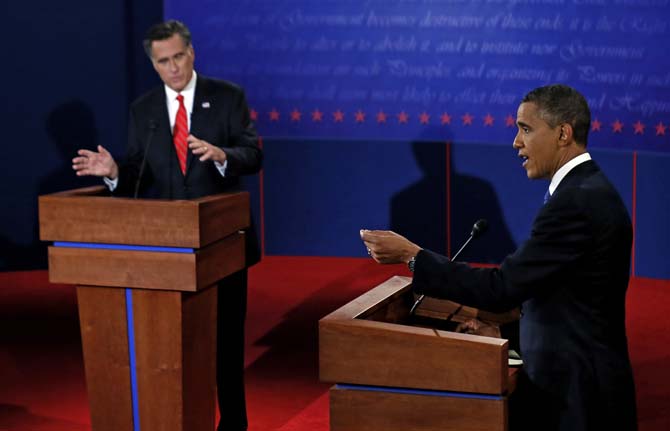The truth might set you free, but lying wins debates.
When the presidential candidates take to the stage tonight, each will come armed with a set of talking points and numbers to bolster his claims and attack his opponent.
And it’ll take a strong nose to sift through the bullshit.
That’s where fact-checking comes in.
Fact-checking websites like PolitiFact and FactCheck have been working hard to keep politicians grounded in reality while major newspapers ranging from The New York Times to The Washington Post have assigned their own teams to test political claims as well.
Politics are ideally a battleground for ideas, not personalities, and ideas only have merit when they have a strong factual base to support them.
This is an ideal that I fear is lost to many Americans, as evidenced by the last time these candidates went toe-to-toe.
Republicans around the country celebrated after Republican nominee Mitt Romney was unanimously declared the winner of the first debate.
However, Romney’s performance was a mix of untruths and reversals.
This isn’t to say President Barack Obama hasn’t misled voters himself.
Obama’s claims that health care premiums have gone up slower under his term than any time in the last 50 years, that Donald Trump qualifies as a small business under Romney’s plan and that he has a $4 trillion deficit reduction plan were all outright false or at least disingenuous.
But Romney’s falsehoods far outweighed Obama’s.
I can acknowledge that, and I’m voting third party.
Romney’s claim that 20 million Americans will lose health care coverage under Obamacare? False.
The Congressional Budget Office (CBO) listed the 20 million mark as its most extreme outcome, but CBO’s baseline estimate was a decline of 3 to 5 million. Other studies supported the baseline, and those losses may not be because of the plan itself.
His insistence that his health care plan would cover those with pre-existing conditions? Also not true.
Romney’s plan would continue the status quo where only those with continual coverage are safe from being denied. Those who have lacked coverage for an extended period of time won’t have options.
Romney’s denial that his tax plan would result in a $5 trillion tax cut mostly paid for by the middle class? At the very least, this claim is mostly false.
Romney’s tax plan is to lower all rates by 20 percent – a decrease that would add up to $4.8 trillion in cuts in 10 years, according to the Tax Policy Center. The Republican candidate argues that he will balance the lost revenue by closing loopholes and deductions.
However, Romney has never specified what loopholes or deductions will be closed, a fact that Fox News’ Chris Wallace has even criticized the campaign for. Without specifics, there is no point in arguing how the cuts might be offset when we do have a specific number of how much they will cost.
Romney and his running mate, Paul Ryan, have argued there are six other studies that show his tax plan can work without raising the burden on middle class Americans. But those six “studies” include blogs, numbers put out by his own campaign and papers that have to assume there is enough economic growth to pay for the revenue loss to add up.
Add in the Republican plan to raise the military budget by $2 trillion and it’s even more difficult to do the math.
Armed with this knowledge, the first debate transforms from an outright win to more of a draw.
Acquaint yourself with this information going into the debate tonight. Understand which talking points have factual support and which don’t.
We can only hold our politicians accountable and be politically informed when we know what is true and what is false.





